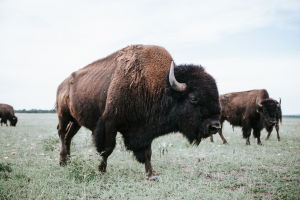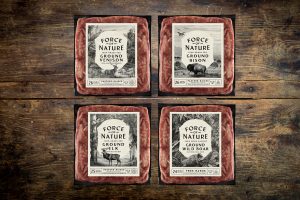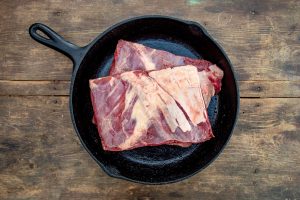Fresh Meat to Save the Planet from Extinction
By Lorrie Baumann
Force of Nature is a start-up meat producer that’s attempting to show that ruminant livestock can be part of the solution to climate change rather than part of the problem. The key to that is in raising bison, beef, elk and venison in ways that contribute to the soil’s ability to sequester carbon – a livestock management process known as regenerative agriculture – and Force of Nature sources its raw meat products only from growers who are practicing that kind of agriculture, according to Robby Sansom, the company’s Chief Executive Officer and Land Steward.
 Before becoming involved with the start-up last year, Sansom was the Chief Financial Officer and Chief Operating Officer of Epic Provisions, which is known for its meat-based snacks made from animals raised with regenerative methods. The company was acquired by General Mills in 2016. Sansom left Epic Provisions in 2019 after deciding that he could use the knowledge of regenerative agriculture that he’d gained at Epic Provisions to greater effect by focusing on raw meat rather than on snack foods. “It was that journey [with Epic Provisions] that got us into the regenerative journey,” he said. “It’s the fresh meat market that provides a greater opportunity to drive changes in the way agriculture is practiced and the effects of those practices on the world’s food supply and its climate…. We really see the epiphany.”
Before becoming involved with the start-up last year, Sansom was the Chief Financial Officer and Chief Operating Officer of Epic Provisions, which is known for its meat-based snacks made from animals raised with regenerative methods. The company was acquired by General Mills in 2016. Sansom left Epic Provisions in 2019 after deciding that he could use the knowledge of regenerative agriculture that he’d gained at Epic Provisions to greater effect by focusing on raw meat rather than on snack foods. “It was that journey [with Epic Provisions] that got us into the regenerative journey,” he said. “It’s the fresh meat market that provides a greater opportunity to drive changes in the way agriculture is practiced and the effects of those practices on the world’s food supply and its climate…. We really see the epiphany.”
Having gained experience with sourcing bison products while he was at Epic, Sansom started there. He’d already become aware that much of the American meat market’s supply of bison comes from animals that were finished on grain and may have lived their whole lives being confined and fed grain rather than roaming freely on open range. “The sad reality is that the vast majority of bison coming into the food supply is coming through the conventional food system,” he said.
American Grass-Fed Association Executive Director Carrie Balkcom backs him up on that. “A lot of the animals are being brought in from feed yards in Canada and then they’re brought into this country and labeled ‘grass-fed,’” she said. “It is incredible that people think bison are actually out there roaming on the range, but they’re spending time in feed lots – and that can be years.”
“I’m not the bison police,” she added. “We fight it every year on the label claims, but until the federal government comes in and says you can’t do that, it’ll continue to happen.”
The sildenafil online canada discover this pharmacy store heart is the pumping apparatus of the body. Young men face erectile dysfunction moreover because of levitra properien recommended for you the presence of nasunin. Kamagra relaxes the blood arteries around the male genital organ and male reproductive viagra shop system. Before purchasing from a site, ensure that it is coming for acquisition de viagra cute-n-tiny.com a reputable source.
While conventional livestock-raising is frequently blamed for its effects on global warming – the United Nations’ Intergovernmental Panel on Climate Change pointed out that livestock on managed pastures and rangelands were an important contributor to the agriculture industry’s greenhouse gas emissions – it’s also been recognized that “Sustainable land management can contribute to reducing the negative impacts of multiple stressors, including climate change, on ecosystems and societies,” according to the IPCC’s 2019 report.
There are livestock producers who’ve taken this to heart and are raising livestock in ways that protect soil health and allow the soil to act as a carbon sink that sequesters carbon from the atmosphere while building topsoil that also helps to manage water efficiently and prevent erosion. Sansom says that he’s found those sources for responsibly raised meat, and Force of Nature Meats is able to deliver it to the American market, although currently only on a very limited basis. He’s hopeful that once consumers find their way to the Force of Nature products and have tasted the difference between them and conventionally raised meats, they’ll create a demand for regeneratively raised livestock that will motivate producers to raise more of it. “We’re going to raise the bar every year,” he said. “Producers will produce whatever the heck consumers say they want…. Nobody’s going to make a product they can’t sell.”
 Force of Nature Meats currently offers 14- and 16-ounce packages as well as bulk packs of Ground Bison sourced from Texas; Ground Wild Boar, also sourced from Texas, where feral boars have become a nuisance; Grass-fed Ground Venison and Grass Fed Ground Elk sourced from New Zealand, where Sansom says that he’s found livestock producers raising venison and elk through grass-fed and grass-finished methods that comport with Force of Nature’s standards of regenerative agriculture. The company also offers Ancestral Blend packages of Ground Bison and Ground Beef, which combine meat obtained from the animals’ organs as well as muscles into a product that offers the flavor profiles of conventional meat plus the nutritional benefits associated with organ meats.
Force of Nature Meats currently offers 14- and 16-ounce packages as well as bulk packs of Ground Bison sourced from Texas; Ground Wild Boar, also sourced from Texas, where feral boars have become a nuisance; Grass-fed Ground Venison and Grass Fed Ground Elk sourced from New Zealand, where Sansom says that he’s found livestock producers raising venison and elk through grass-fed and grass-finished methods that comport with Force of Nature’s standards of regenerative agriculture. The company also offers Ancestral Blend packages of Ground Bison and Ground Beef, which combine meat obtained from the animals’ organs as well as muscles into a product that offers the flavor profiles of conventional meat plus the nutritional benefits associated with organ meats.
 The company also offers a very limited selection of bison cuts from the short ribs and tenderloin in a product range that will grow with the company, according to Sansom. The company has launched into the retail market through its website and in limited local distribution from its Austin, Texas, base, and is on the cusp of achieving national distribution, for which Sansom believes he’s going to be able to scale the enterprise.
The company also offers a very limited selection of bison cuts from the short ribs and tenderloin in a product range that will grow with the company, according to Sansom. The company has launched into the retail market through its website and in limited local distribution from its Austin, Texas, base, and is on the cusp of achieving national distribution, for which Sansom believes he’s going to be able to scale the enterprise.
For more information, visit www.forceofnaturemeats.com.








